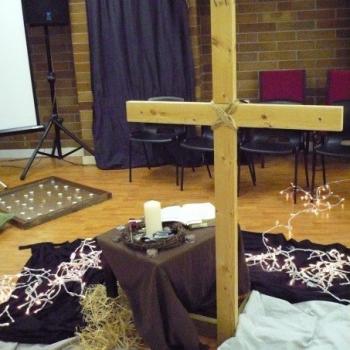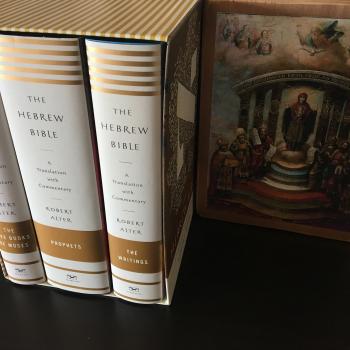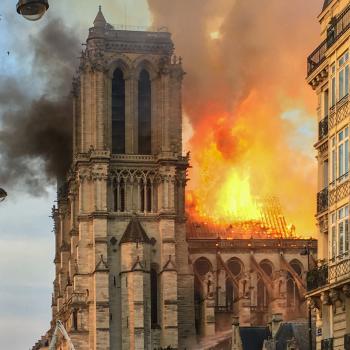![Pope Francis at St Peter's Square - by Edgar Jiménez from Porto, Portugal (Pope_Francis_among_the_people_at_St._Peters_Square_-_12_May_2013.jpg) [CC-BY-SA 2.0 (https://creativecommons.org/licenses/by-sa/2.0/)], via Flickr](https://wp-media.patheos.com/blogs/sites/721/2015/11/Pope_Francis_among_the_people_at_St._Peters_Square_-_12_May_2013-1024x768.jpg)
To be sure, I’m still an Anglican – a Chinglican, rather – which makes me the least qualified to speak about a debate among Catholics in which the word ‘heresy‘ is being thrown around and made to sound synonymous with ‘liberal Protestantism’ or (Cranmer forbid) the ‘Anglican Communion.’ That I, who am still a canonical schismatic, am seeing a Jesuit spiritual director probably doesn’t make the Society of Jesus look any better than the non-so-subtle jabs Douthat has been throwing around, including columns about Pope Francis’s ‘ostentatious humility’ and ‘plot to change Catholicism,’ tweets about La Cività Cattolica‘s Antonio Spadaro’s ‘moustache-twirling cartoon villain‘ with a last name synonymous with ‘sophist,’ and a First Things lecture lamenting the continued success of Jesuit universities among the Catholic faithful. Even America Magazine‘s Jim Martin’s name seems to have been ‘dragged through the mud.’
This is a little tempest in a teapot, really – as numerous friends and colleagues have pointed out to me, no posts have been lost, no excommunications have been issued, no one’s been tortured, and no heads have rolled. But if the stakes are this low, it means that we can have a little bit of fun.
As far as I can tell from the spiritual direction sessions I’ve had so far, the big Jesuit plot to take over the world has to do with convincing the ‘subject’ – as in, my selfhood – that subjective experience has something to do with the supernatural. Because of this, most lovers of religious orders of the Dominican and Benedictine variety seem to think of Jesuits as floozies, which is really too bad because, having also gotten spiritual counselling from the Dominicans of the Polish variety (which means they’re truly legit), I’d say that Jesuits, Dominicans, and Benedictines believe pretty much the same thing about the supernatural.
I came to this conclusion because, as I’ve worked through things with my spiritual director, I’ve come to the conclusion that prior to really getting to know the Jesuits, I’ve been thinking about spiritual direction all wrong. This is probably because my Anglicanism is, for better or worse, heavily influenced by Susan Howatch’s Church of England series, where the Anglican monk serving as the spiritual director is like really into Carl Jung. I’m not dissing Jung, per se, but I am saying that I’ve discovered that I’ve often thought of spiritual direction more like psychotherapy, in which (as one of my friends who is way too influenced by the Franciscans used to make fun of me) the task is more or less an ‘exegesis of the self.’
For all the Ignatian talk about subjectivity, Jesuit spiritual direction isn’t really an exegesis of the self, per se. It feels (hahaha) more like an exegesis of the effect of the supernatural on the self. As I understand it from my spiritual director, there are consolations (the effects of supernatural grace that give life to the self) and desolations (the effects of supernatural attacks that demoralize the self).
This means that if we’re going to talk about a big Jesuit plot, it’s something along the lines of actually having to believe in a reality called the supernatural, or what one French Jesuit who has had no small impact on post-Vatican II Catholicism, Henri de Lubac, calls le surnaturel, the ‘suspended middle’ (as, hehe, Anglican theologian John Milbank calls it) between nature and grace. If we’re going to talk about ‘consolations’ and ‘desolations’ as ‘grace’ and ‘attacks,’ it means (God forbid) that we actually have to believe in the personal existence of angels, demons, and (good heavens!) God himself.
I don’t have a theology degree, and I’m really just a beginner at this Jesuit thing (I haven’t even made the Exercises!), but forgive me if it sounds like this big Jesuit plot to take over the world is fairly orthodox, even conservative. Of course, I understand that what some self-professing ‘conservatives’ are allergic to may be all this talk about the ‘subjective’ – I suppose the word ‘heresy’ is being floated when people are talking about, say, the consolations and desolations that befall persons in divorce-and-remarriage situations when they can’t receive the Eucharist. But the point here, I claim, is not ‘heresy’ versus ‘orthodoxy’; heavens, if we’re talking about le surnaturel, how far can we even fall from the faith passed on through Holy Mother Church? It might rather be that these Protestant categories of ‘liberal = subjective’ and ‘conservative = objective’ don’t really play well in Catholic circles because the objective Dominicans and the subjective Jesuits will all likely agree that a) the supernatural objectively exists, b) it can objectively do something to your subjectivity, and c) it’s therefore worth probing the subject as a window into the objective supernatural. Duh.
Come to think of it, maybe demolishing these ideological categories will turn out to be one of the greatest contributions of this Jesuit pope’s magisterium.
But what do I know? I’m a Chinglican without a theology degree receiving Jesuit spiritual direction while having Dominican friends, so for all intents and purposes, I may well have fallen victim to the big Jesuit plot and ended up thinking with the church and her magisterium while still being canonically linked to the See of Canterbury. Oops.












